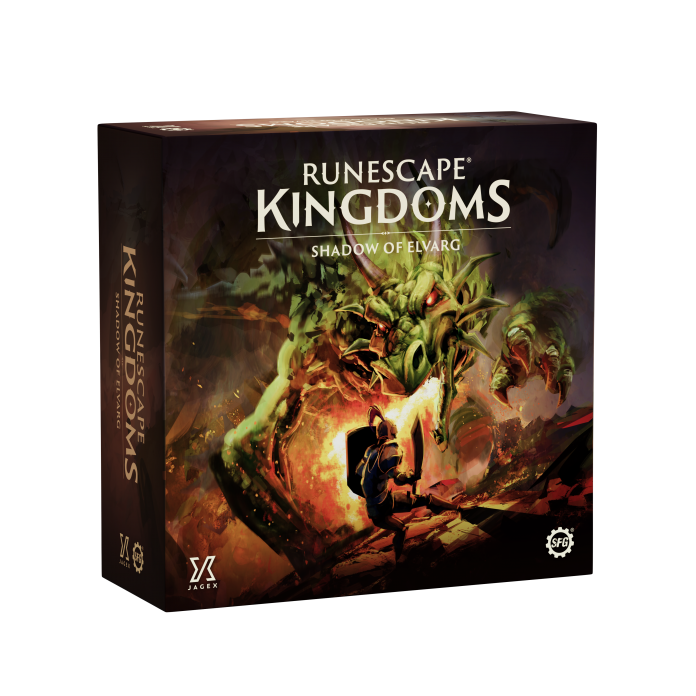RuneScape was not my first MMO, but it holds a special place in my heart. My little brother is 10 years younger than me and RuneScape was his first MMO. He started playing while I was away at college and hopping around Gielnor was a fun way to keep in touch with him while I was gone.
Naturally he was the first person I reached out to when Steamforged games announced a tabletop version. Known formally as RuneScape Kingdoms: Shadow of Elvarg, this new cooperative campaign adventure will feel immediately familiar to anyone who has played either existing version of RuneScape.
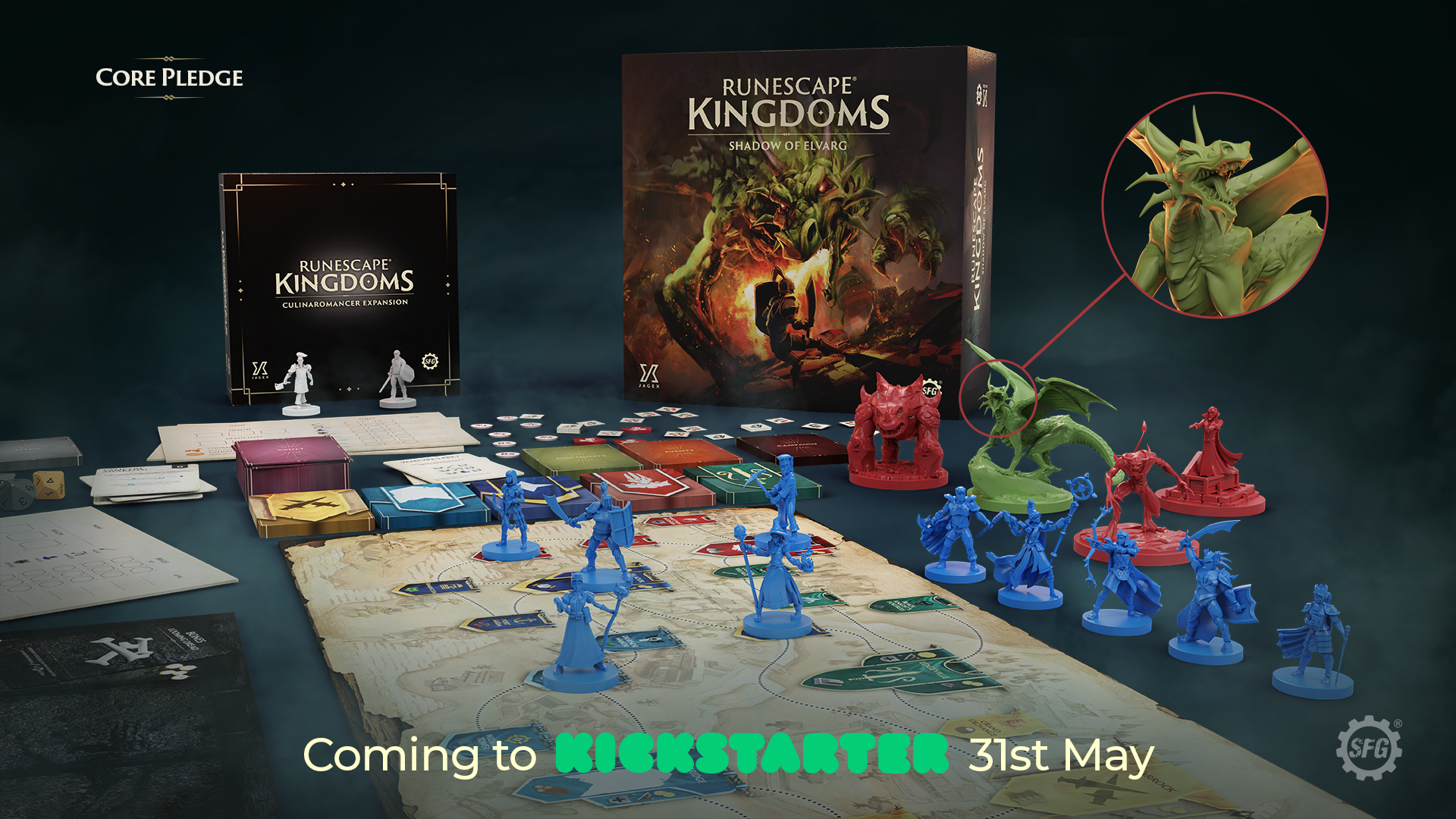
A Fast-Travel Adventure
When the team at Steamforged offered the opportunity to hop on Tabletopia for a hands-on demo of the new game I couldn’t resist. Licensed games can be exciting, but the process of adapting familiar media—particularly video games—is tricky. A lot of mechanisms and systems don’t translate. Capturing the feel of the experience can be a challenge.
The first thing I noticed when I saw the game laid out was the lack of squares. Specifically, dungeon squares. I am at this point used to seeing cooperative fantasy adventures realized as tactical combat dungeon crawlers. Everyone loads up their character, puts it on the board, and takes their turn counting move spaces, rolling battle dice, and flipping through storybooks. RuneScape Kingdoms goes in a very different direction that I think is perfect for an MMO adaptation.
The bulk of play takes places on the realm board where the dirty business of exploring and grinding is highly abstracted. On your turn you optionally move to an adjacent City or location and then take a single action. These can be Quest Actions which fulfill your personal side-quests or the larger campaign narrative, or Exploration Actions.
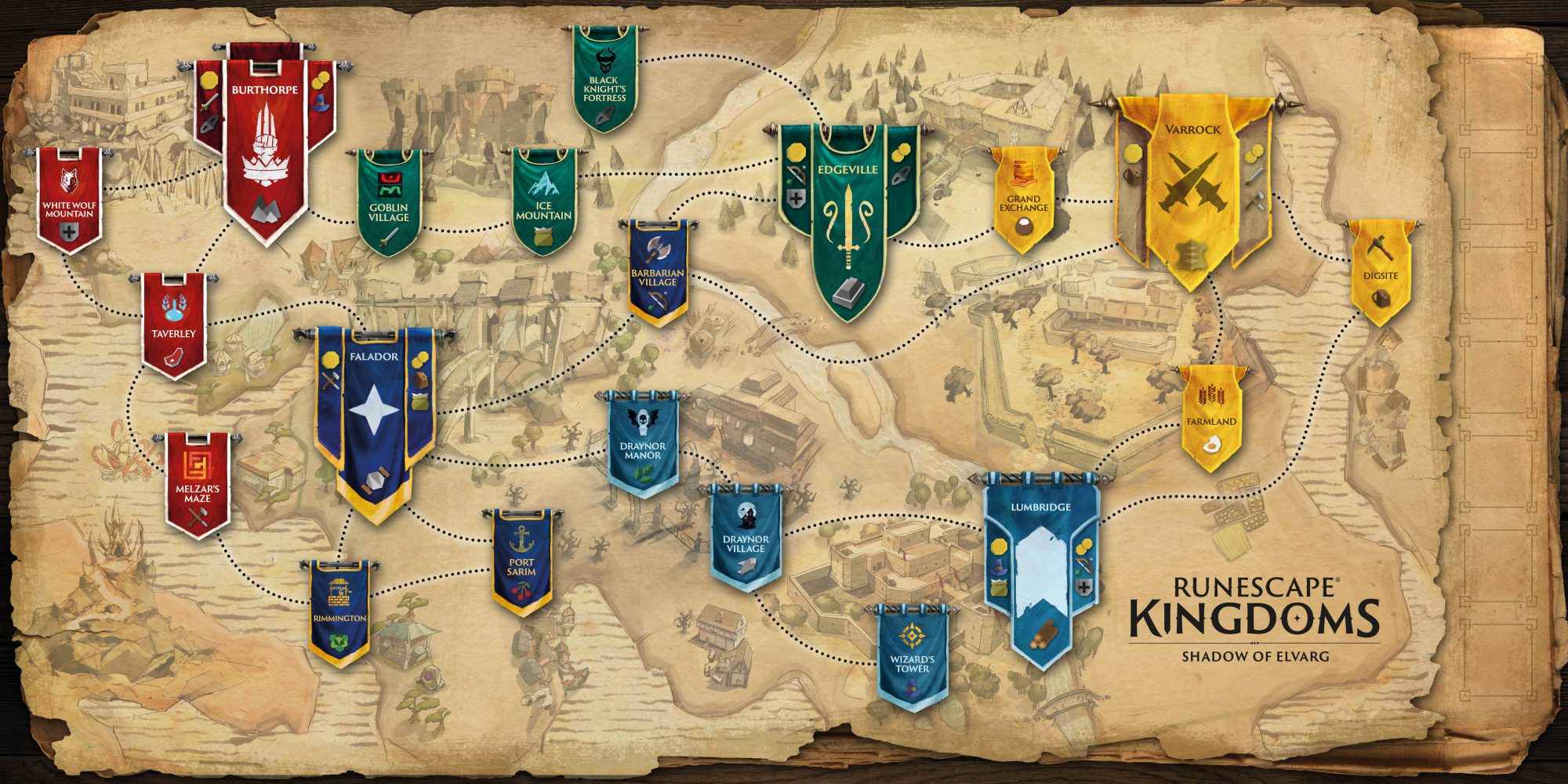
Exploring provinces has you draw from a deck themed to your region. Depending on your luck you might face enemies, resolve narrative events, or meet NPCs. Some of these events will point you towards a campaign deck that gives you special items or seeds the exploration decks with the results of your actions. This is a lighter version of the narrative system in something like Gloomhaven but I’m happy to see an echo here. It always brings a smile to player’s faces to see their own actions reflected in the game.
The process of moving about and exploring is most of what you’ll do across a multi-hour campaign adventure, and like any good MMO will see you leveling and upping your skills. Every time you use a skill, whether you succeed or fail, will impart experience in that skill. While succeeding can further boost it or provide more rewards it’s great to have a fail-forward mentality in a game as charming as RuneScape.
A Pleasant Grind
The purpose of leveling up these skills is to prepare for an eventual showdown with the Big Bad. A single “game” of RuneScape Kingdoms represents skilling up for a bit and facing down a boss in a Grandmaster Quest familiar to anyone whose played the original. I put game in quotes up there because a single campaign can run 2-3 hours, and the game box is designed to store in-progress campaigns should you need to spread it across a few sessions.
Each Campaign will see players completing Main Quests. The first campaign, “Vampyre Slayer” has 6 quests that must be undertaken by the team before fighting Count Draynor in his lair. Some of these quests must be completed in order and will require preparing yourself by leveling up your skills.
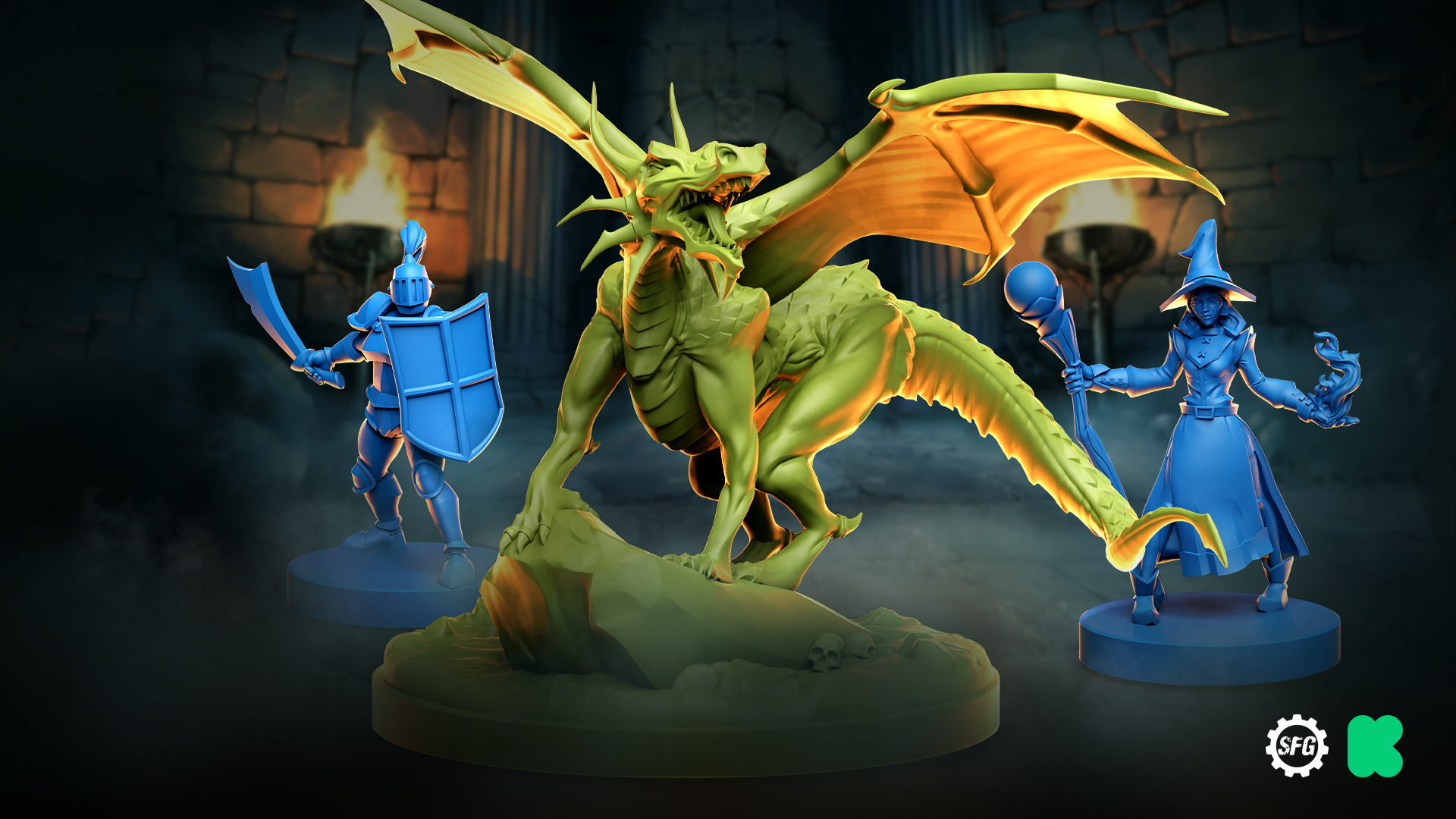
In this way the campaign mirrors the standard play-pattern of an MMORPG. Yes, the bad guy will kill you if you try to fight him immediately. Yes, there are enemies that will be too strong for you to face right out the gate. Yes, you meet Death literally and figuratively (the NPC death appears in the tabletop version too).
Accordingly, you’ll spend quite a bit of time adventuring and completing other side quests. Grinding, if you will, to level up skills and acquire the resources you need to craft new weapons and armor.
Grinding is minimal and I don’t expect it to feel like the evenings I spent hours trapping critters on my PC, but it does abstract the concept of spending time on your characters in an adventureful world. The ability to share resources and items between players by dropping them in a “Clan Bank” adds to the communal MMO feel.
A Tactical Boss Battle
Unlike an MMO, tabletop top games need a source of pressure to limit players. Afterall you don’t want your tabletop gamers to be able to sit at a table for hours on end until every skill is at maximum like they could (in theory) do in an MMO.
In RuneScape Kingdoms this comes in the way of an Escalation Track that periodically advances. Each time it fills a Campaign Card reflecting the behind-the-scenes actions of the Big Bad will change the environment. New enemies, new challenges, and tweaks to global rules can all appear to push you to face the Big Bad as soon as you feel comfortable (or maybe a little sooner). It will also, eventually, force you into your final showdown.
At this point the game shifts. Instead of being an abstracted travel map you’ll battle your final combat on a 9-square tactical board. This will be immediately familiar to anyone who has played the Dark Souls board game. I noted that it immediately reminded me of that system and Lead Designer Jamie Perkins confirmed that it is a sort of spiritual successor.
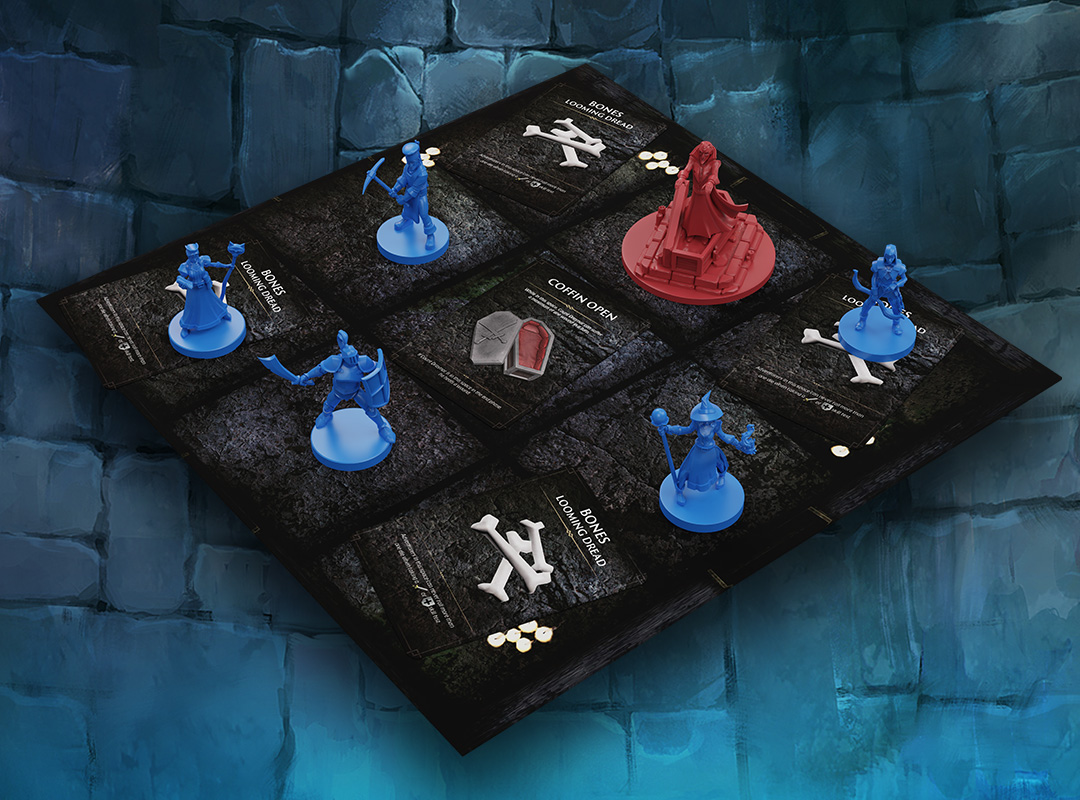
At this point your battle is one to the end. You’ll defeat your enemy or you’ll all perish and need to begin again, battered but with more knowledge. One thing I appreciate is that the core turn structure does not change. Move, then attack. Move, then attack. This mirrors the Move, then Action structure of the previous hours of play reducing player load.
Each enemy has different strategies and weaknesses meaning that each campaign will require specializing in different skills. This ensures the 4 Core campaigns feel different and don’t pigeonhole players into following the same path. Particularly notable is the open class system; just because your miniature is a Wizard doesn’t mean you’ll be a Mage. Progression is organic…you level what you use, and each player should get a chance to shine.
Closing Thoughts
It’s important for me to stress that I played a short demo, not a full campaign. The nature of Kickstarter means that some things may change between now and fulfillment. I am, however, more excited than I was at the time of announcement.
RuneScape was a fantastic first MMO for my 10 year old little brother but also a hell of a good time for me, a 20 year old college kid. RuneScape Kingdoms is accessible from the ground up. Simple turn structures, easy die resolutions, and clear progression systems means that this game looks to be a fantastic first adventure game for younger gamers.
What about us grey-hairs? Will this still be a hell of a good time for us? On that I’m less willing to plant a full flag without more time with the game. The Boss Battle I played was great, it is light and tactical and felt satisfying. My concern comes with the multiple hours before it.
How much will I enjoy moving around the board drawing cards and leveling up for a couple hours? Will it ever begin to feel like a true, dreaded grind? That will depend on the strength of the narrative elements and variety of the cards. RuneScape the video game manages to make this fun through a combination of light-hearted humor and varied adventures.
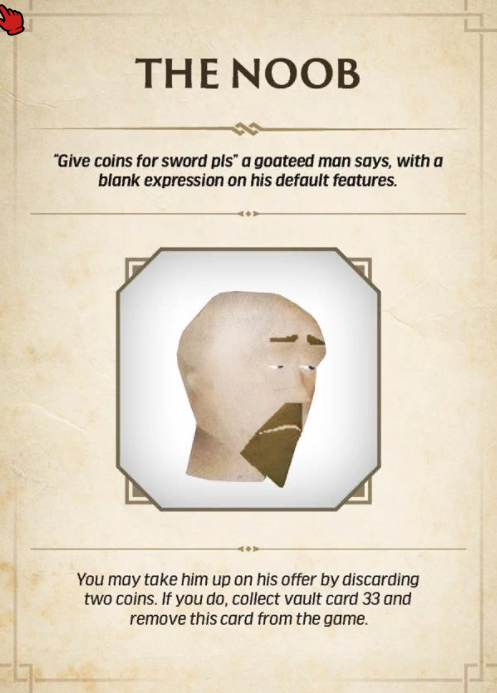
RuneScape Kingdoms has managed to capture the humor (Gertrude’s Cat is here, as is an NPC named “Noob” that will ask you to help him buy his first sword), and the variety certainly exists I just didn’t get a chance to play through all of it.
I’m optimistic, however. Flat out, I enjoyed the hour or so I spent exploring this new version of an old classic. As Return to Dark Tower proves, simple and accessible does not mean easy or boring. All 4 Core campaigns string together in a new unique (and canonical!) story for Gielnor, and I’m looking forward to playing the final product and continuing my exploration.
RuneScape Kingdoms: Shadow of Elvarg is currently on Kickstarter.
